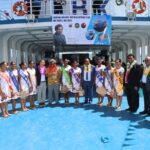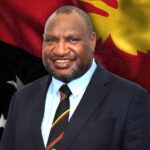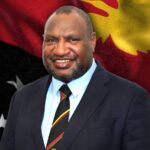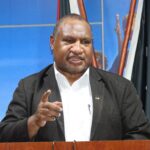Prime Minister Hon. James Marape has issued a compelling call to action for the people of Papua New Guinea to curtail the consumption of betelnut and sugary foods and beverages. Furthermore, he has urged all Members of Parliament (MPs) to take a proactive role in addressing these issues through their respective District Development Authorities (DDAs), including the allocation of funds for dental care initiatives.
Prime Minister Marape expressed his concerns during his visit to the Youth With A Mission (YWAM) dental programme in Port Moresby on Saturday, August 5, 2023. The visit prompted a critical realisation of the challenges facing the nation’s oral health landscape.
Highlighting the urgency of the situation, Prime Minister Marape shared alarming statistics presented during his visit. Notably, Papua New Guinea holds the unfortunate distinction of having the highest global incidence of lip and oral cavity cancer, a trend strongly linked to betelnut chewing. Additionally, a prevalent issue is tooth decay among Papua New Guineans, exacerbated by the widespread consumption of sugary foods and beverages. Remarkably, the country lacks a comprehensive Oral Health Policy within its Health Plan, which Prime Minister Marape said he would get Department of Health to urgently address.
“Discovering that Papua New Guinea leads in lip and oral cavity cancer cases due to betelnut chewing is deeply concerning,” expressed Prime Minister Marape.
“This habit not only jeopardises health but also contributes to the unsanitary condition of our cities and towns nationwide.”
Prime Minister Marape further emphasised, “It is equally distressing to acknowledge the widespread tooth decay crisis among our citizens, largely attributed to the consumption of sugary products. I call upon all Papua New Guineans to embrace a reduction in betelnut consumption and the intake of sugary foods and drinks.”
Acknowledging the scarcity of dentists and inadequate dental care infrastructure in the country, Prime Minister Marape appealed to all MPs to assume responsibility for these challenges. He urged MPs to allocate necessary funding for the establishment and enhancement of dental care facilities within their respective districts.
The YWAM School Dental Programme has been actively engaged with three schools in the National Capital District. The programme adheres to World Health Organisation (WHO) guidelines, conducting oral health screenings for children aged five, 12, and 15. A total of 804 students underwent oral health screening, during which 1,629 dental procedures were performed.
YWAM highlighted the following key points to Prime Minister Marape:
• Papua New Guinea holds the highest per capita rate of lip and oral cavity cancer globally, primarily attributed to widespread betelnut chewing.
• Tooth decay affects over 80 per cent of students screened in each school, with over 50 per cent reporting tooth pain in two of these schools.
• WHO’s 2019 report revealed a stark shortage of dentists in Papua New Guinea, with only 62 practicing nationwide. Additionally, the nation is equipped with merely 35 dental therapists, professionals specialising in children’s dental care.
• Poor oral health adversely impacts children’s nutrition, overall health, and development.
• School-based efforts play a vital role in preventing oral conditions, diseases, and disorders. Given the substantial number of schools in Port Moresby—over 100—the educational setting offers a strategic platform for delivering oral health services to children.
• Regrettably, Papua New Guinea’s Health Plan currently lacks an Oral Health Policy.






